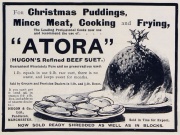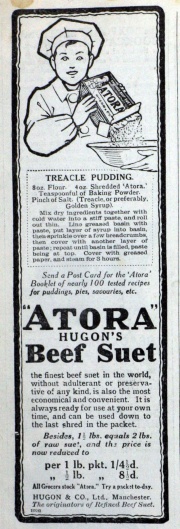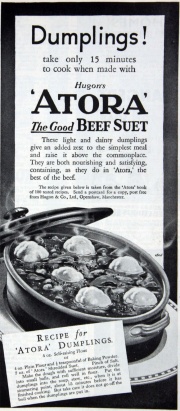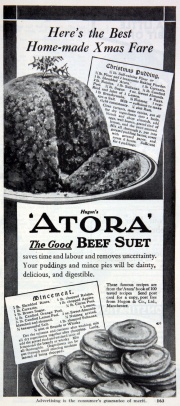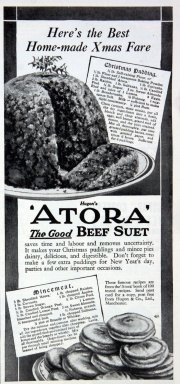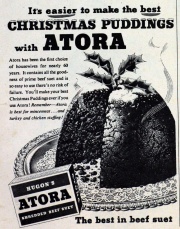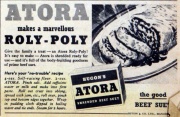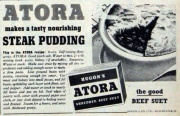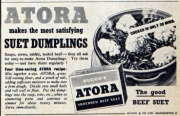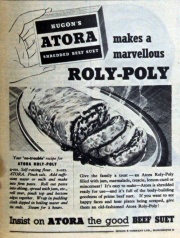Difference between revisions of "Atora"
| Line 1: | Line 1: | ||
[[image:Im1905PEARS-Atora.jpg|thumb| 1905. ]] | |||
[[Image:Im192204GHK-Atora.jpg|thumb|1922.]] | [[Image:Im192204GHK-Atora.jpg|thumb|1922.]] | ||
[[image:Im193311GHK-Atora.jpg|thumb| November 1933. ]] | [[image:Im193311GHK-Atora.jpg|thumb| November 1933. ]] | ||
| Line 12: | Line 13: | ||
[[image:Im19541030PP-Ato.jpg|thumb| October 1954.]] | [[image:Im19541030PP-Ato.jpg|thumb| October 1954.]] | ||
''' | '''[[Hugon and Co]]''' of Manchester. | ||
'''Atora''' is a British brand of shredded suet, which is clarified beef fat, primarily used in the production of pastry and dumplings. | '''Atora''' is a British brand of shredded suet, which is clarified beef fat, primarily used in the production of pastry and dumplings. | ||
Revision as of 10:20, 12 December 2013
Hugon and Co of Manchester.
Atora is a British brand of shredded suet, which is clarified beef fat, primarily used in the production of pastry and dumplings.
Suet (clarified beef fat) had one of its first mentions in a recipe of 1617 as a key ingredient for 'Cambridge pudding' served to students at that university. At this time, suet was time consuming to use and prepare, and involved removing the fat from beef, clarifying it over heat, and chopping it ready for use.
1893 Frenchman Gabriel Hugon sold his engraving business and set up his new company, Hugon and Co, a suet factory. The company came about after he saw his wife chopping suet by hand and had the idea that it would be so much easier if you were able to buy suet already chopped. The company's Openshaw factory was the largest factory of its kind in the world.
1895 The name Atora (from the Spanish word for bull, toro) was registered, and is still registered today. To reinforce the connection with the meaning of the name, up until World War II, the suet was transported around the country by painted wagons pulled by six pairs of Hereford bulls.
1963 The business was bought by Ranks Hovis McDougall.
1974 Suet production was moved to Greatham, Hartlepool from Openshaw, Manchester.
2008 Atora sells more than 2,300 tons of suet in Britain each year - enough to make one million dumplings a day!


